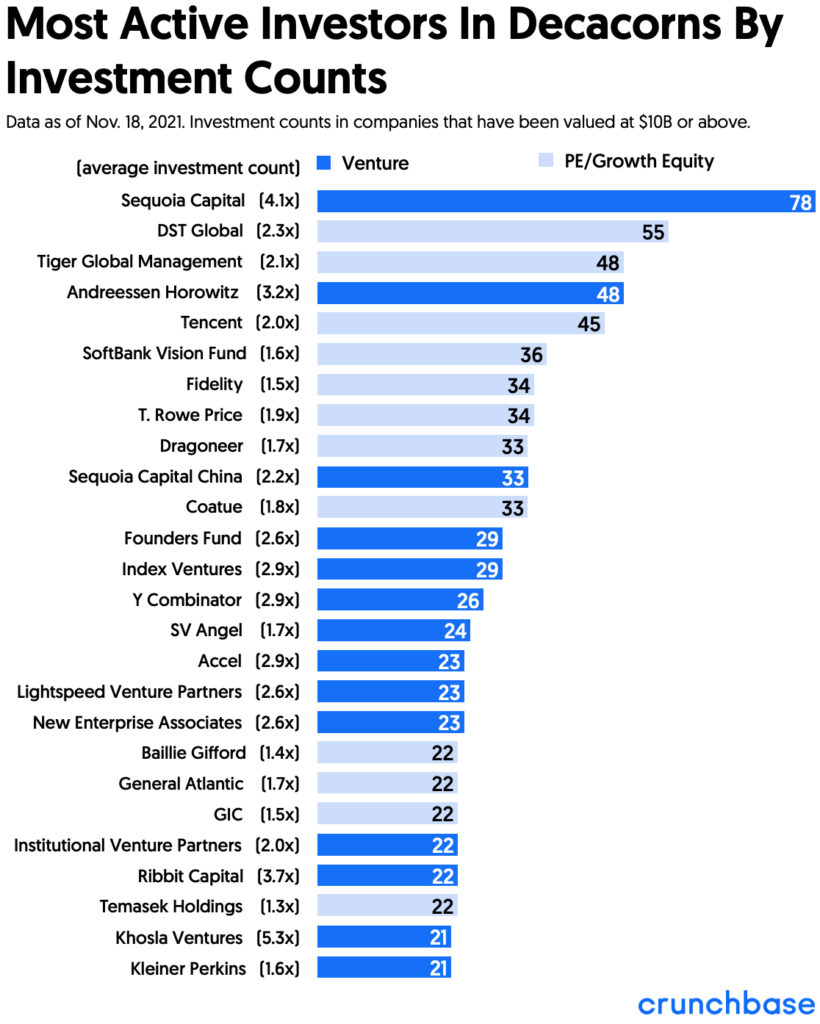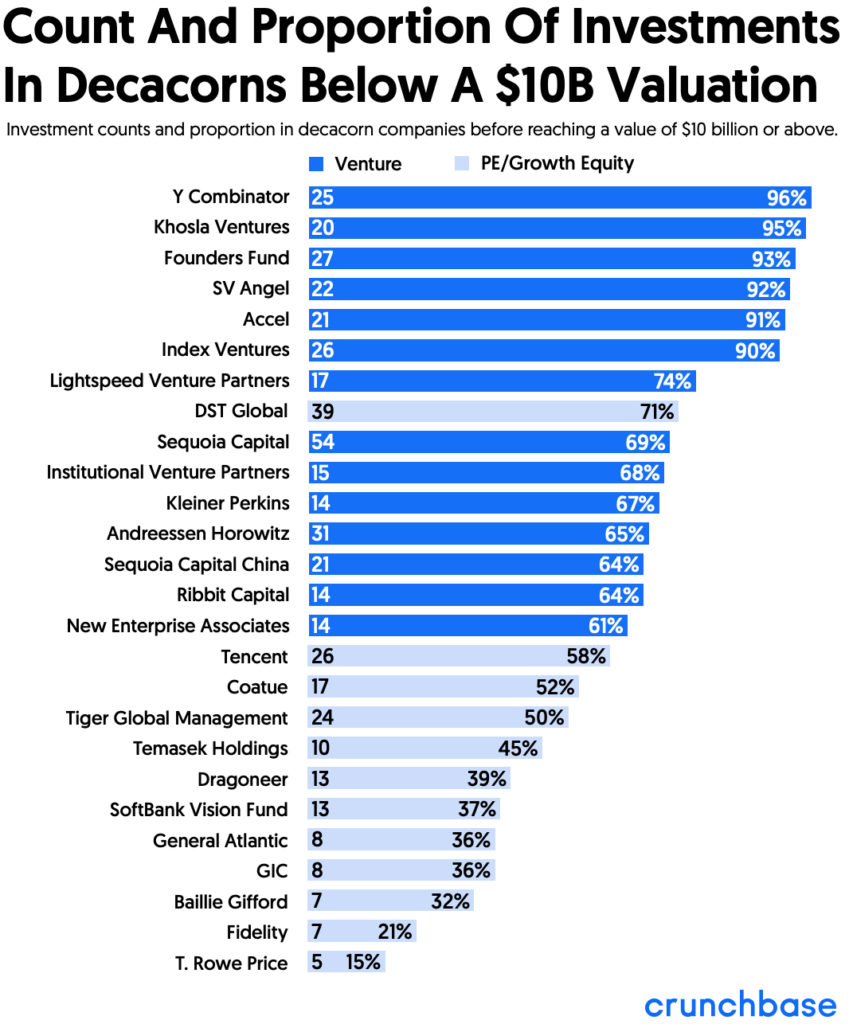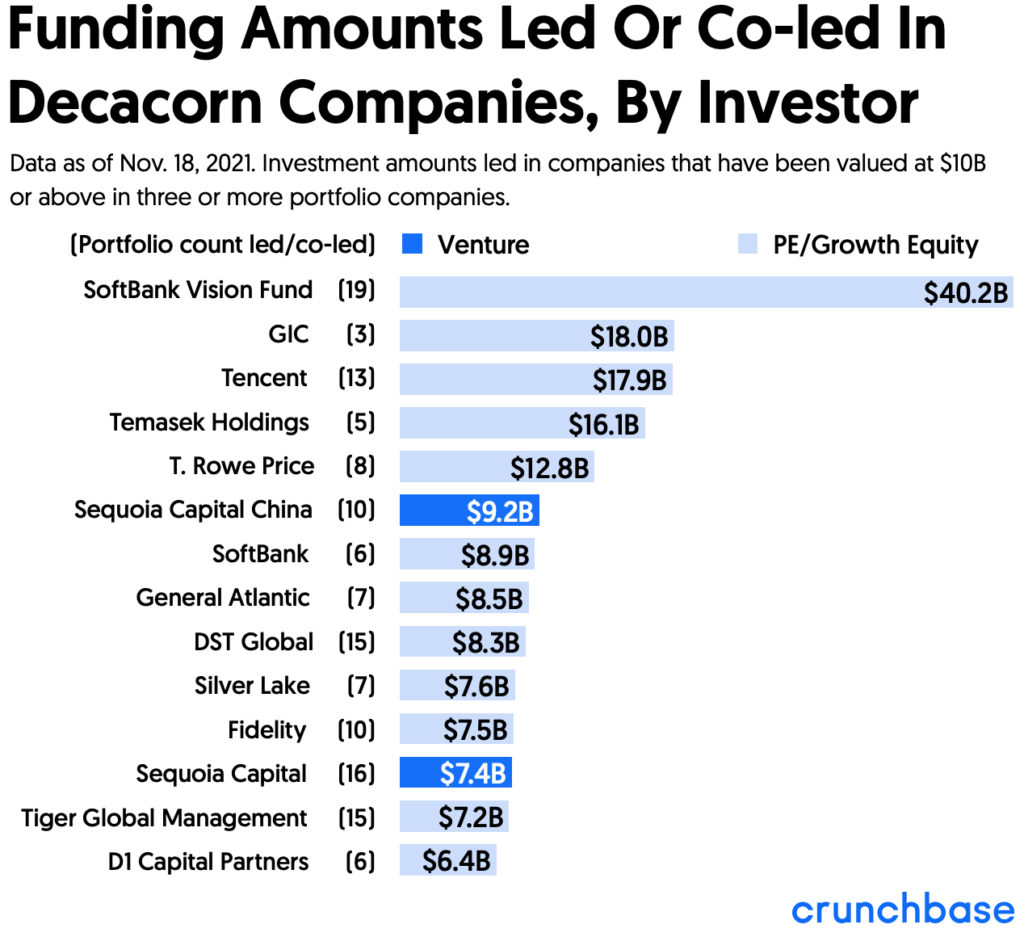This year has seen the number of new companies valued as decacorns double already, compared to 2020, marking the highest year on record for new startups valued at $10 billion or more.
Subscribe to the Crunchbase Daily
Since the first decacorn was born in 2007—when Facebook, now Meta, was valued at $15 billion in a funding round as a private company—there have been 84 of these companies in total, per Crunchbase data. Of those, 33 have exited, 31 via a public market debut.
So, who are the most active investors in these highly valued private companies, of which 30 new ones have been minted as decacorns year to date?1
Across all time, Sequoia Capital has been the most active investor in these decacorns, a Crunchbase News analysis shows. The Silicon Valley-based firm has made 78 investments across 19 portfolio companies, representing investment in more than 20 percent of all decacorns. DST Global, headquartered in Hong Kong, is the second-most active investor in this cohort, with 55 investments across 24 decacorn companies, the highest count of portfolio companies for an investor. New York-based Tiger Global Management and Silicon Valley-based Andreessen Horowitz round out the top three decacorn investors, each with 48 investments across 23 and 15 such companies, respectively. Investors that invest early and keep investing in subsequent rounds to maintain ownership are often called conviction investors because they demonstrate belief that a company will do well over time, even in the early stages when the outcome is not clear. With that in mind, we thought it would be useful to look at the total number of investments these firms have made in the decacorns in their portfolios over time. Sequoia Capital, Crunchbase data shows, has made an average of 4.1 investments in each of its decacorn portfolio companies. Khosla Ventures, meanwhile, demonstrates the highest conviction with 5.3 investments averaging across its four decacorn portfolio companies. Ribbit Capital is the third-highest conviction investor with an average of 3.7 rounds across its six decacorn companies. And Andreessen Horowitz has made an average 3.2 rounds per decacorn portfolio company, Crunchbase data shows. Leading venture firms listed here mostly average between two to just under three rounds in the decacorns they invest in, per Crunchbase data. Exceptions include SV Angel, a seed investor whose strong network has helped it get stakes in 14 decacorn companies, though it does not invest as often in follow-on rounds, likely due to the size of its fund. SV Angel averages 1.7 rounds per decacorn portfolio company, according to Crunchbase data. Kleiner Perkins is also an exception for active venture firms, investing in 1.6 rounds per portfolio decacorn. From our analysis, Kleiner Perkins has first invested more often at Series C and later funding rounds in these decacorns. Private equity and growth investors’ average investments in decacorn companies range from the lower end of 1.3 rounds (Temasek) up to DST Global (2.3 rounds on average). These firms tend to invest in growth-stage rounds, hence a lower count of follow-on fundings on average. However, in the past few years, growth equity firms have been known to invest in startups earlier, including via more Series A and B fundings. We also looked at which investors tend to invest in advance of a portfolio company reaching a decacorn valuation. On an exit these investments firms will have higher multiples having invested at lower valuations. Firm who invested at the largest valuations could be underwater on an exit if a company is valued below its last private valuation. The investors with the highest proportions of their investments in these decacorn companies before those startups are valued at $10 billion are primarily venture investors. Y Combinator, Khosla Ventures, Founders Fund, SV Angel and Accel have all made 90 percent or more of their investments in their decacorn portfolio in advance of those companies reaching decacorn status. Growth equity investors who invest at the later stages tend to have a lower proportion of rounds before the $10 billion valuation as shown in the chart below. Out of the growth equity investors, DST Global stands out as the growth investor with highest count of pre-decacorn investments at 71 percent of its investments in this cohort. Other growth investors Tencent, Coatue and Tiger Global are all above 50 percent of investments pre-decacorn in their portfolio companies. Fidelity and T. Rowe Price are the most active proportionally in fundings at $10 billion in valuation and up. Firms leading or co-leading by the largest amounts in these 84 companies are the SoftBank Vision Fund at $40 billion in 19 portfolio companies, GIC leading or co-leading with $18 billion in three portfolio companies, and Tencent, with $17.9 billion in 13 portfolio companies. Sequoia Capital China and Sequoia Capital are the only venture firms to list in the top 13 firms for leading or co-leading large rounds at $9.2 billion and $7.4 billion, respectively. What becomes clear from this analysis is that private equity firms and hedge funds are driving these valuations from a fear of missing out on the tech pipeline going public. The concerns of missing out are reinforced as companies access more capital in the private markets, drive higher valuations and stay private longer. And more private equity firms join the fray. The concern that all the upside or growth for these companies will happen while they are private has also fallen by the wayside as some of these companies continue to see their valuations surge on the public markets. Take Facebook— the first decacorn, back in 2007—now valued in the public markets at $949 billion. As another example, Snowflake is now valued at $109 billion, up from its last private valuation of $12.4 billion in September 2020. Overall, this class of decacorns that have gone public are largely up from their last private valuations. It’s worth keeping in mind that those sky-high valuations were not seen for private companies prior to 2007 and remained scarce until 2014. Now, unicorns, and increasingly, decacorns, are no longer anomalies. Crunchbase Pro queries relevant to this article Methodology Decacorn companies are assessed based on the following criteria: A privately held, venture-backed company valued at $10 billion or more in a funding event. Exited decacorn companies are companies with a $10 billion private round valuation that have since been acquired or had a public debut. Illustration: Dom Guzman Data for this article is based on funding disclosed in Crunchbase as of Nov. 18, 2021. If an investment is missing for a firm we report on here, the analysis could change. If you believe our analysis is missing data or otherwise inaccurate, please email gene@crunchbase.com.↩
Stay up to date with recent funding rounds, acquisitions, and more with the
Crunchbase Daily.

Investing with conviction
Investing pre-decacorn


In summary



![Illustration of a magnet attracting various products. [Dom Guzman]](https://news.crunchbase.com/wp-content/uploads/mergers_and_acquisitions-470x352.jpg)

![Illustration of toast with $ toasted in. [Dom Guzman]](https://news.crunchbase.com/wp-content/uploads/Forecast-dollar-sign-300x168.jpg)


67.1K Followers